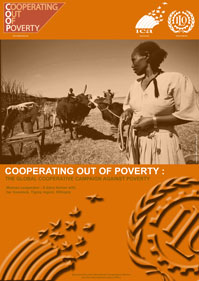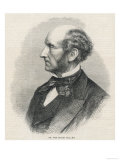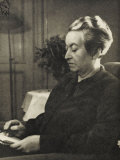|
|
|
|
|
|
|
PEACE & JUSTICE CALENDARS
|
|
|
|
|
|
|
|
|
|
|
|
|
|
|
|
|
|
|
|
|
|
|
|
|
|
|
|
|
|
 |
|
|
|
|
|
|
Margaret Mead
b. 12-16-1901; Philadelphia, PA
d. 11-15-1978; NYC
Anthropologist Margaret Mead taught at Columbia University and Fordham University, as well as mentoring numerous students.
EARTH DAY CEREMONY
United Nations, March 20, 1977 - “It makes me feel very humble to be here today and to realize what this day means, because I have lived long enough to see us come to know that we have only one Earth and to come to know that all the people on this planet are one species.
This was a matter of hope and of faith before. Not until World War II, when we explored the whole Earth, its deepest valleys and its highest mountains and looked everywhere for the people that were there, did we know for certain that all of us on this planet were one species, human beings. And then as we began to go into space for the first time, to leave this planet for the first time, we came to know that not only were we the only people on this Earth, and all one people, but also that Earth was the only inhabited planet in the solar system - that we were all alone here, all alone to be the custodians of life on this Earth.
We used to call it, you know, “the Earth.” Now, we call it “Earth.” And we didn't speak of a “planet” when I was a child. Sometimes we talked of the “globe.” But then we referred to an artificial globe which human beings had made to represent this Earth for them.
So that only, in the last quarter of my life, have I, like all those here, come to know what it means to be the custodians of the future of Earth: To know that unless we take care, unless we check the rapacious exploitation of Earth, unless we protect our rivers and our lakes, our oceans and our skies, we are endangering the future of our children and our children's children.
We didn't know this, except in little pieces. People knew they had to take care of their own meadows, of their own forests or their own rivers. But it was not until we saw the picture of Earth from the moon that we realized how small and helpless this planet is, something that we must hold in our arms and care for.
Earth Day is to be the first completely international and universal holiday that the world has ever known. Every other holiday was tied to one place, or some political or special event. This Day is tied to Earth itself, and to the place of Earth in the whole solar system.
At this moment, when I climb the steps and ring the Peace Bell, it will be the Equinox in every part of the world, and we can all celebrate it at once on behalf of every part of the world.
|
|
|
|
Donella Meadows
b. 3-13-1941; Elgin, Illinois
d. 2-20-2001; Hanover, NH
Environmental teacher and author Donella Meadows is best remembered for her work on the 1972 book The Limits to Growth, modeling the consequences of a rapidly growing world population and finite resource supplies. The study was commissioned by the Club of Rome, a global think tank that considers a variety of international political issues, founded in April 1968.
|
|
|
|
Rigoberta Menchú
b. 1-9-1959; Guatemala
Indigenous Guatemalan of the K'iche' ethnic group, Rigoberta Menchú received the 1992 Nobel Peace Prize for ”her work for social justice and ethno-cultural reconciliation based on respect for the rights of indigenous peoples.”
|
|
|
|
Chico Mendes
b. 12-15-1944; Xapuri, Brazil
d. 12-22-1988
Labor and environmental activist Chico Mendes was gunned down for organizing resistance to the wholesale burning of the Amazon forest. He had convinced the government to take back land ranchers had stolen at gunpoint, or through graft, and then to transform it into “extractive reserves,” set aside for the sustainable production of rubber, nuts, and other goods harvested from the living forest.
• “At first I thought I was fighting to save rubber trees, then I thought I was fighting to save the Amazon rainforest. Now I realise I am fighting for humanity.”
|
|
|
|
Thomas Merton
b. 1-31-1915; France
d. 12-10-1968; Bangkok, Thailand
Poet, teacher, social activist and student of comparative religion Thomas Merton wrote more than 70 books, mostly on spirituality, as well as scores of essays and reviews. As a Trappist monk he became well known for his dialogues with other faiths and his non-violent stand during the race riots and Vietnam War of the 1960s.
As Merton was leaving the stage after delivering a speech at a peace conference in Bangkok his parting remark was “Now I am going to disappear.” A short time later he died from touching a poorly grounded electric fan while stepping out of his bath.
Thomas Merton quotes ~
• “Peace demands the most heroic labor and the most difficult sacrifice. It demands greater heroism than war. It demands greater fidelity to the truth and a much more perfect purity of conscience.”
• “Love seeks one thing only: the good of the one loved. It leaves all the other secondary effects to take care of themselves. Love, therefore, is its own reward.”
• “The whole idea of compassion is based on a keen awareness of the interdependence of all these living beings, which are all part of one another, and all involved in one another.”
• “We are so obsessed with doing that we have no time and no imagination left for being. As a result, men are valued not for what they are but for what they do or what they have - for their usefulness.”
• “Advertising treats all products with the reverence and the seriousness due to sacraments.”
• “If you want to study the social and political history of modern nations, study hell.”
• “October is a fine and dangerous season in America, a wonderful time to begin anything at all. You go to college, and every course in the catalogue looks wonderful.”
• “The least of the work of learning is done in the classroom.”
• “What can we gain by sailing to the moon if we are not able to cross the abyss that separates us from ourselves? This is the most important of all voyages of discovery, and without it, all the rest are not only useless, but disastrous.”
• “Happiness is not a matter of intensity but of balance, order, rhythm and harmony.”
• “A life is either all spiritual or not spiritual at all. No man can serve two masters. Your life is shaped by the end you live for. You are made in the image of what you desire.”
• “In the last analysis, the individual person is responsible for living his own life and for “finding himself.” If he persists in shifting his responsibility to somebody else, he fails to find out the meaning of his own existence.”
• “Art enables us to find ourselves and lose ourselves at the same time.”
• The Seven Storey Mountain
|
|
|
|
John Stuart Mill
b. 5-20-1806; London
d. 5-8-1873; Avignon, France
John Stuart Mill, an influential contributor to social theory, political theory, and political economy, conceived liberty as the freedom of the individual in opposition to unlimited state control.
Mill advocated Utilitarianism, the idea that “the moral worth of an action is determined solely by its usefulness in maximizing utility/minimizing negative utility (utility can be defined as pleasure, preference satisfaction, knowledge or other things) as summed among all sentient beings.”
• A System of Logic
• Mill Quote Originality poster
• Mill Quote Civilization poster
|
|
Harriet Taylor Mill, née Hardy
b. 10-8-1807; London, England
d. 11-3-1858; France (tuberculosis)
Harriet Taylor Mill, the wife of philosopher John Stuart Mill, published little of her work during her lifetime however her writing reveals she had radical views on marriage and women's rights.
|
|
|
|
Kate Millett
b. 9-14-1934; St. Paul, MN
Kate Millett, a feminist writer and activist, is best known for her 1970 book Sexual Politics.
Kate Millett quotes:
• “Because of our social circumstances, male and female are really two cultures and their life experiences are utterly different.”
• “Many women do not recognize themselves as discriminated against; no better proof could be found of the totality of their conditioning.”
• “Politics is repetition. It is not change. Change is something beyond what we call politics. Change is the essence, politics is supposed to be the means to bring into being.”
• “The concept of romantic love affords a means of emotional manipulation which the male is free to exploit, since love is the only circumstance in which the female is (ideologically) pardoned for sexual activity.”
• “This country is becoming increasingly authoritarian. It's based on capital punishment.”
• “In those days, when you got boxed, that was it. A lot of old people were there because somebody wanted the farm. It was about property. People are treated like property.”
|
|
|
|
Gabriela Mistral
b. 4-7-1889; Chile
d. 1-10-1957
Chilean poet Lucila Godoy Alcayaga, known as Gabriela Mistral, was an educator who worked on behalf of homeless children in Mexico.
• Nobel Prize for Literature, 1945
|
|
|
previous page | top | next
peace & justice activists list | a | b | c | d | e | f | g | h | i-j | k | L
| Ma | ME-MI | Mo | Mu | n | o | p | r | s | t | u-v | w | x-y-z
|
|
I have searched the web for visual, text, and manipulative curriculum support materials - teaching posters, art prints, maps, charts, calendars, books and educational toys featuring famous people, places and events - to help teachers optimize their valuable time and budget.
Browsing the subject areas at NetPosterWorks.com is a learning experience where educators can plan context rich environments while comparing prices, special discounts, framing options and shipping from educational resources.
Thank you for starting your search for inspirational, motivational, and educational posters and learning materials at NetPosterWorks.com. If you need help please contact us.
|
|
|






















